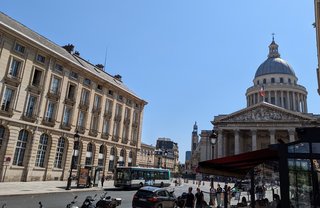The Centennial Congress of the International Geographical Union (IGU) was my first opportunity to present my research findings in person to the international geographic community, and a valuable chance to receive critical feedback and input from colleagues and experts in my field. The French Committee for Geography organized this conference to celebrate the 100th anniversary of the International Geographical Union, bringing together geographers from around the world. The overarching theme of the conference was "Time for Geographers" and aimed to explore the connections between the spatial and temporal dimensions of the living environments of humans and non-humans.
The conference featured a variety of parallel sessions, keynote presentations, roundtable discussions, exhibitions, and several scientific and social events. It provided an opportunity to gain insights into different research areas in geography, to meet colleagues, and to expand my professional network.
I was given the opportunity to give an oral presentation in a session on "Geohazards, Risk And Vulnerability: Following The Case Studies Of Mitigation And Management". I presented a draft paper based on data I collected in 2021 as part of my doctoral research, entitled "Translocal responses to natural hazards and environmental change: the case of Indonesian migrant communities in Germany and the Netherlands." Assuming that social networks create a flow of financial and social remittances in them that influence resilience and adaptation, I examined the characteristics and determinants of different types of support that Indonesian migrant communities in Germany and the Netherlands provide to their family members affected by natural disasters in Indonesia. My results show that support from migrants is can come into play in a variety of ways. Ultimately, I demonstrated that migration can be a multifaceted driver for building and maintaining adaptive capacity to natural hazards and environmental change.
The feedback I received on my presentation will be incorporated into the final draft of my paper. I would like to thank the Graduate School of Geosciences for the travel grant that allowed me to attend this event.
Konstantin Gisevius
PhD student
Institute of Geography
PhD project: “(Trans-)local social networks – a socio-spatial approach towards understanding adaptive capacities of urban coastal households and communities in Indonesia”
